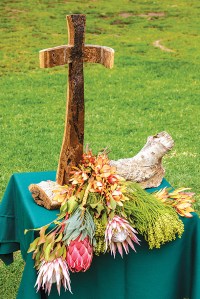Unique setting for ecological conversion
News
People seeking a connection to community and a way to share their passion for the environment came together to celebrate the feast of Creation on September 6.

Celebrating Mass outdoors amongst nature at Stockade Botanical Park proved a deeply moving experience for participants.
Organised by the Council for Integral Ecology as part of the annual Season of Creation celebration, the Mass was attended by about 60 people. Each attendee received a seed packet of either herbs, vegetables or flowers as a thank you for their participation.
The Council’s chair, Sanjay Mohanaraj, who organised the Mass, said it was hoped the seeds would be planted in people’s gardens as a way of “sharing in God’s work of renewal and regrowth”.
Advertisement

Sanjay said the Mass was a “unique experience to immerse in the richness and wonder of the surrounding environment”.
“The music provided by Oblate Youth SA was just beautiful, with some people moved to tears during the Mass,” he said.
“It was truly an ecologically spiritual event and a great start to the celebrations of the Season of Creation.”
A shared picnic lunch followed the Mass, which was celebrated by Archbishop Patrick O’Regan with concelebrants Fr Michael Trainor and Deacon Tee Ping Koh.
Fr Trainor said there were many moments of “peaceful reflection and contemplation” in the Mass that moved him.
This year’s theme for the Season of Creation was ‘Peace with Creation’, inspired by the book of Isaiah, chapter 32: verse 14-18. This scripture passage contrasts a desolate, deserted world – resulting from injustice and broken relationships – with the possibility of restoration and peace when justice is renewed. It emphasises that there can be no peace without justice – both for humanity and for the Earth.
Advertisement
In his homily, Archbishop O’Regan said it was time to recognise the “beauty, fragility and sacredness of the world entrusted to our care”.
He referred to the algal bloom spreading across South Australia’s coastal waters and said while it might at first seem part of the “natural order”, it was a sign of what Pope Leo XIV called “the wounds of sin” written into creation.
He said the algal bloom outbreak was not an isolated incident but part of a larger pattern: rising temperatures, extreme weather, species loss and fragile ecosystems pushed to the brink.
“These wounds are not evenly shared,” he said.
“The poor, the marginalised and indigenous communities are the first to suffer.
“Creation itself, entrusted to our care, becomes collateral damage in humanity’s pursuit of short-term gain.
“And yet, amid this sobering reality, the Gospel calls us not to despair but to sow seeds of hope.
“The seed, as Jesus teaches, begins small. A smile, a prayer, a decision to recycle, a choice to walk instead of drive, a community garden, a parish initiative – none of these will change the world overnight.
“But together they form an ecosystem of care, grounded in fidelity and nourished by love. Like wildflowers breaking through the tarmac, they announce that God’s Spirit is alive, renewing the face of the earth.”
The Season of Creation runs from September 1 to October 4, the feast of St Francis of Assisi.
Archbishop O’Regan’s homily can be found on his page at Catholic Archdiocese of Adelaide – Messages.











